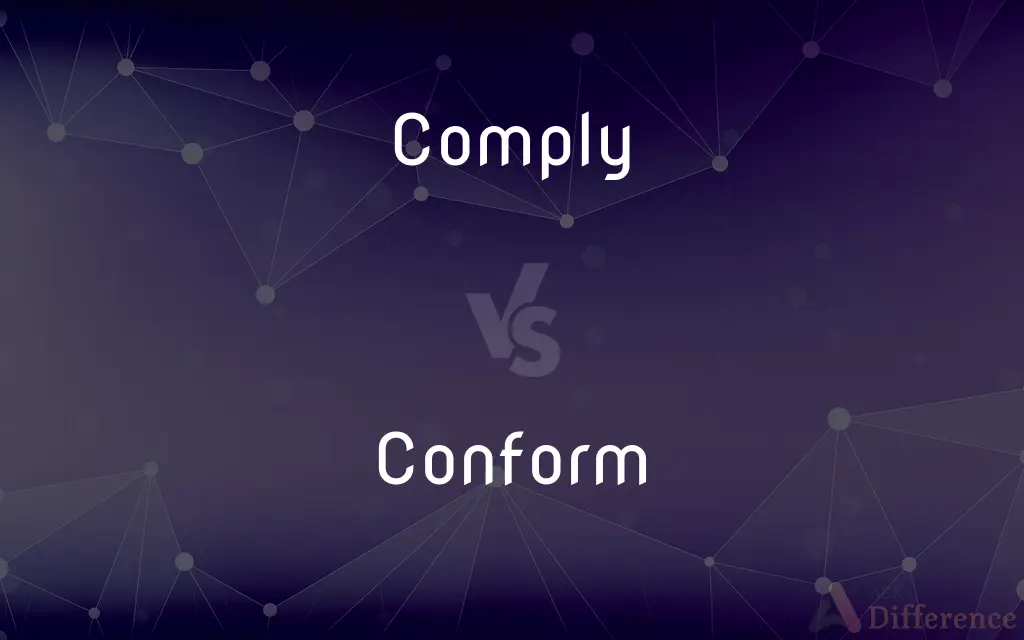Comply vs. Conform — What's the Difference?
By Tayyaba Rehman & Maham Liaqat — Updated on March 20, 2024
Comply involves adhering to rules or requests, often from authority; conform refers to adjusting behaviors or actions to match standards or norms.

Difference Between Comply and Conform
Table of Contents
ADVERTISEMENT
Key Differences
Complying is the act of following specific instructions, rules, or requests, typically issued by an authority figure or institution. It often implies a response to a direct command or regulation. Whereas conforming involves adjusting one’s behavior, actions, or beliefs to align with social norms, group standards, or societal expectations, not necessarily in response to a direct order.
Compliance often requires individuals to act in a certain way or adhere to specific guidelines laid out by an external entity, such as laws, regulations, or direct requests. On the other hand, conformity is driven by the desire to fit in, be accepted, or meet the implicit expectations of a group or society, which may not be explicitly stated as rules.
The motivation behind compliance is usually to avoid negative consequences, such as penalties, fines, or disapproval from an authority. Whereas the motivation to conform often stems from the desire for social acceptance, avoiding social ostracism, or the internal satisfaction of being part of a group.
Compliance is measured by the extent to which actions align with the given directives or rules. It is often externally monitored and enforced by the authority issuing the command. In contrast, conformity is more about internal or social monitoring, where adherence to norms is often evaluated by peers or through self-assessment.
The scope of compliance is usually limited to specific behaviors or actions required by the rules or requests, and it may not reflect an individual’s personal beliefs or attitudes. Conformity, however, can extend to attitudes, values, and beliefs, influencing a broader range of an individual’s behavior to match those of their social group.
ADVERTISEMENT
Comparison Chart
Definition
Act of following rules, orders, or requests
Adjusting behaviors or beliefs to match group norms or standards
Source
Authority figures, laws, regulations
Social norms, group standards, societal expectations
Motivation
Avoiding negative consequences, legal compliance
Desire for social acceptance, internal satisfaction
Measurement
Alignment with specific directives, externally enforced
Adherence to group norms, often internally or socially monitored
Scope
Limited to specific actions as per directives
Can extend to behaviors, attitudes, and beliefs
Driver
External commands or regulations
Internal desire or social pressure to fit in
Impact on Beliefs
May not align with personal beliefs
May influence personal beliefs and values
Monitoring
Often by the issuing authority or regulatory bodies
By peers, group members, or self-assessment
Consequences
Penalties, fines, disapproval from authority
Social ostracism, loss of group acceptance
Compare with Definitions
Comply
Meeting standards set by an external body.
The construction complied with all the safety standards.
Conform
Adjusting actions or beliefs to group norms.
New employees may conform to the company culture to fit in.
Comply
Adherence to legal or formal guidelines.
Banks comply with financial laws to ensure transparency and security.
Conform
Mirroring the attitudes or behaviors of a group.
To conform in the new city, he adopted the local dialect.
Comply
Acting upon specific requests or orders.
The prisoner complied with the guard's instructions without hesitation.
Conform
Following societal expectations without explicit instructions.
Community members conform to local traditions during holidays.
Comply
To act in accordance with a wish or command.
Companies must comply with environmental regulations to operate.
Conform
Seeking acceptance by matching one’s actions to those of others.
Artists sometimes conform to popular trends for wider recognition.
Comply
Following rules or directives from an authority.
Employees are required to comply with company policies.
Conform
To behave according to socially accepted conventions.
Teenagers often feel pressured to conform to their peers' fashion choices.
Comply
To act in accordance with another's command, request, rule, or wish
The patient complied with the physician's orders.
Conform
To be in accordance with a set of specifications or regulations, or with a policy or guideline.
Comply
(Obsolete) To be courteous or obedient.
Conform
To be or act in accord with a set of standards, expectations, or specifications
A computer that conforms with the manufacturer's advertising claims.
Students learning to conform to school safety rules.
Comply
To yield assent; to accord; to acquiesce, agree, consent; to adapt oneself, to conform.
Conform
To act, often unquestioningly, in accordance with traditional customs or prevailing standards
"Our table manners ... change from time to time, but the changes are not reasoned out.
We merely notice and conform" (Mark Twain).
Comply
(archaic) To accomplish, to fulfil.
Conform
To be similar in form or pattern
A windy road that conforms to the coastline.
A shirt that conforms to different body shapes.
Comply
(archaic) To be ceremoniously courteous; to make one's compliments.
Conform
To bring into accord or agreement; cause to correspond or comply
"a woman who has conformed herself to the male-designed image of virtuous widowhood so that she can live in peace" (Jennifer Panek).
Comply
(archaic) To enfold; to embrace.
Conform
To act in accordance with expectations; to behave in the manner of others, especially as a result of social pressure.
Comply
To yield assent; to accord; agree, or acquiesce; to adapt one's self; to consent or conform; - usually followed by with.
Yet this be sure, in nothing to comply,Scandalous or forbidden in our law.
They did servilely comply with the people in worshiping God by sensible images.
He that complies against his willIs of his own opinion still.
Conform
(transitive) To make similar in form or nature; to make suitable for a purpose; to adapt.
Comply
To be ceremoniously courteous; to make one's compliments.
Conform
Of the same form; similar in import; conformable.
Care must be taken that the interpretation be every way conform to the analogy of faith.
Comply
To fulfill; to accomplish.
Conform
To shape in accordance with; to make like; to bring into harmony or agreement with; - usually with to or unto.
Demand of them wherefore they conform not themselves unto the order of the church.
Comply
To infold; to embrace.
Seemed to comply,Cloudlike, the daintie deitie.
Conform
To be in accord or harmony; to comply; to be obedient; to submit; - with to or with.
A rule to which experience must conform.
Comply
Act in accordance with someone's rules, commands, or wishes;
He complied with my instructions
You must comply or else!
Follow these simple rules
Abide by the rules
Conform
To comply with the usages of the Established Church; to be a conformist.
About two thousand ministers whose consciences did not suffer them to conform were driven from their benefices in a day.
Conform
Be similar, be in line with
Conform
Adapt or conform oneself to new or different conditions;
We must adjust to the bad economic situation
Common Curiosities
What does it mean to comply?
Complying means to follow rules, orders, or requests from an authority or regulation.
Why do people comply?
People comply to avoid negative consequences, meet legal obligations, or adhere to formal guidelines.
What motivates conformity?
The desire for social acceptance, fear of ostracism, or the internal satisfaction of being part of a group motivates conformity.
How does conforming differ from complying?
Conforming involves adjusting behaviors or beliefs to align with group norms or societal standards, without necessarily following explicit instructions.
What happens if you don't conform?
Non-conformity may result in social ostracism or loss of acceptance within a group.
Is complying always mandatory?
Compliance is mandatory when it involves legal regulations or formal requests from authorities.
Does conformity change personal beliefs?
Conformity can influence personal beliefs and values, as it often involves internal adjustments to fit in with a group.
Can compliance affect personal beliefs?
Compliance may not necessarily align with personal beliefs; it's often an external adherence to rules.
Can someone conform too much?
Excessive conformity can lead to loss of individuality and may suppress personal beliefs or creativity.
How does conformity affect group dynamics?
Conformity can strengthen group cohesion but may also discourage diversity and individual expression.
What's the difference between complying with a law and conforming to social etiquette?
Complying with a law is following legal requirements set by authorities, while conforming to social etiquette involves adhering to unwritten social norms for behavior.
What monitors conformity?
Conformity is monitored by peers, group members, or through self-assessment, focusing on adherence to social norms.
How is compliance measured?
Compliance is measured by how well actions align with specific directives and is often monitored by the authority issuing the rules.
What are the consequences of non-compliance?
Non-compliance can lead to penalties, fines, or disapproval from the authority.
Do companies need to comply with laws?
Yes, companies must comply with relevant laws and regulations to legally operate.
Share Your Discovery

Previous Comparison
Steak vs. Stake
Next Comparison
Primipara vs. MultiparaAuthor Spotlight
Written by
Tayyaba RehmanTayyaba Rehman is a distinguished writer, currently serving as a primary contributor to askdifference.com. As a researcher in semantics and etymology, Tayyaba's passion for the complexity of languages and their distinctions has found a perfect home on the platform. Tayyaba delves into the intricacies of language, distinguishing between commonly confused words and phrases, thereby providing clarity for readers worldwide.
Co-written by
Maham Liaqat













































